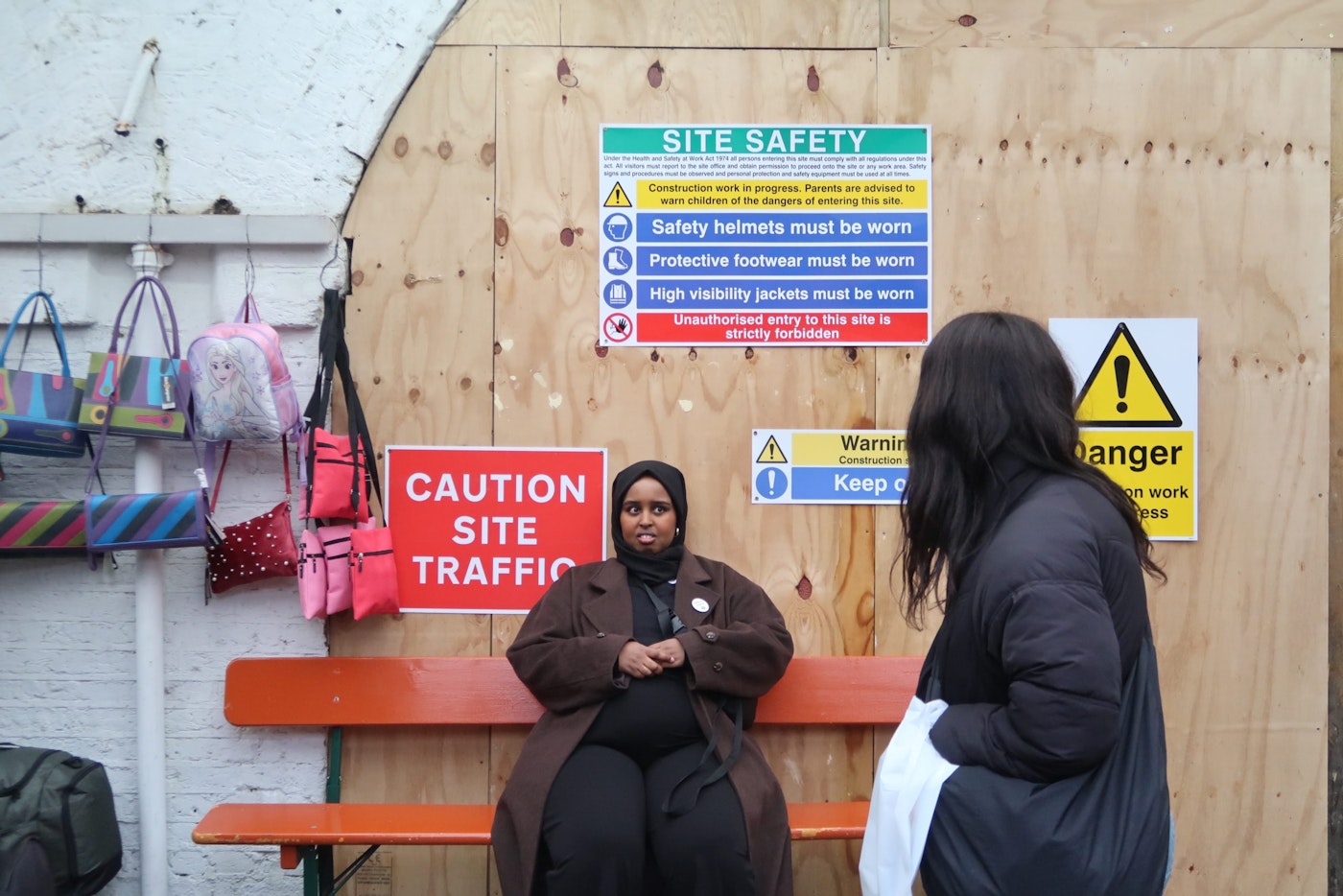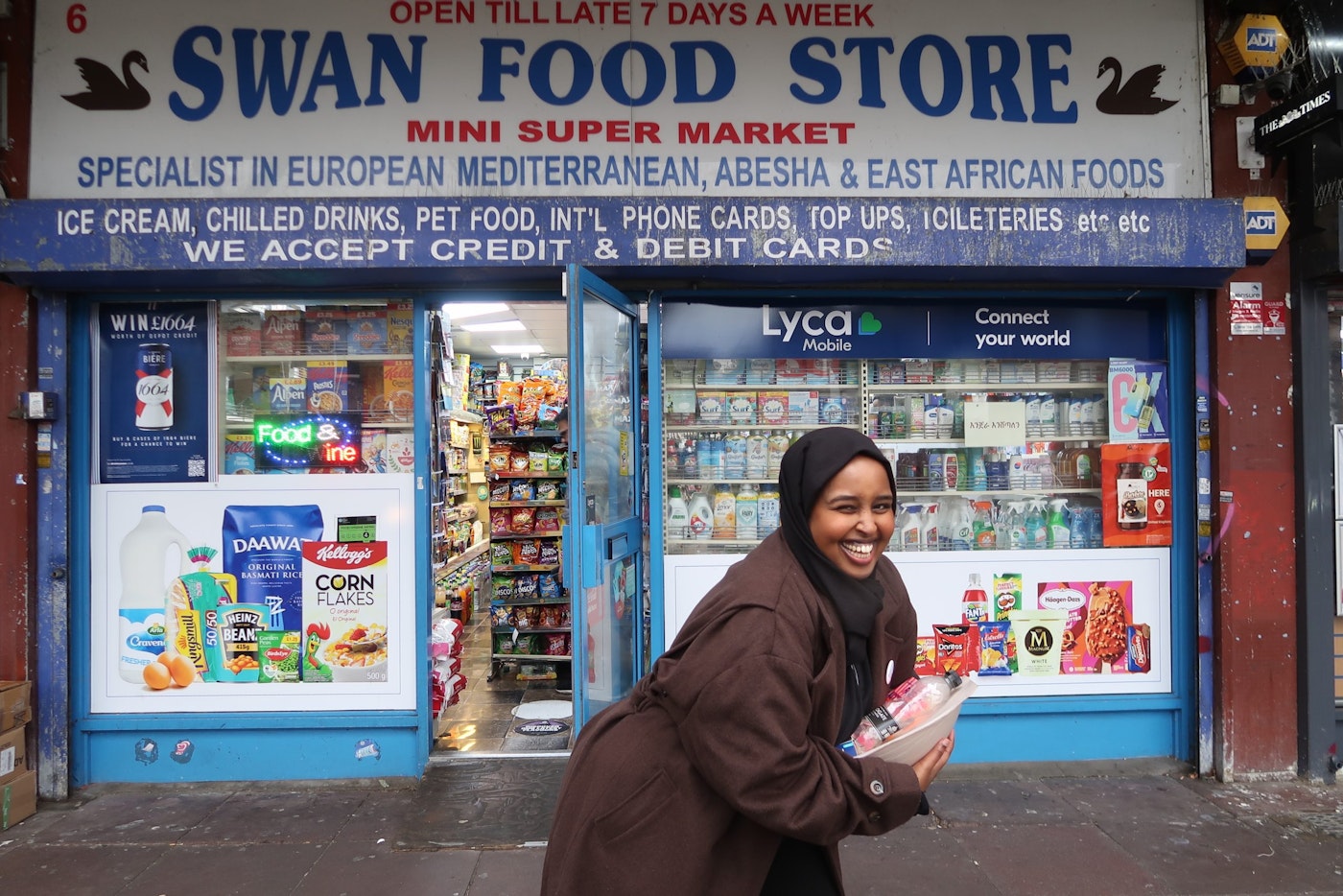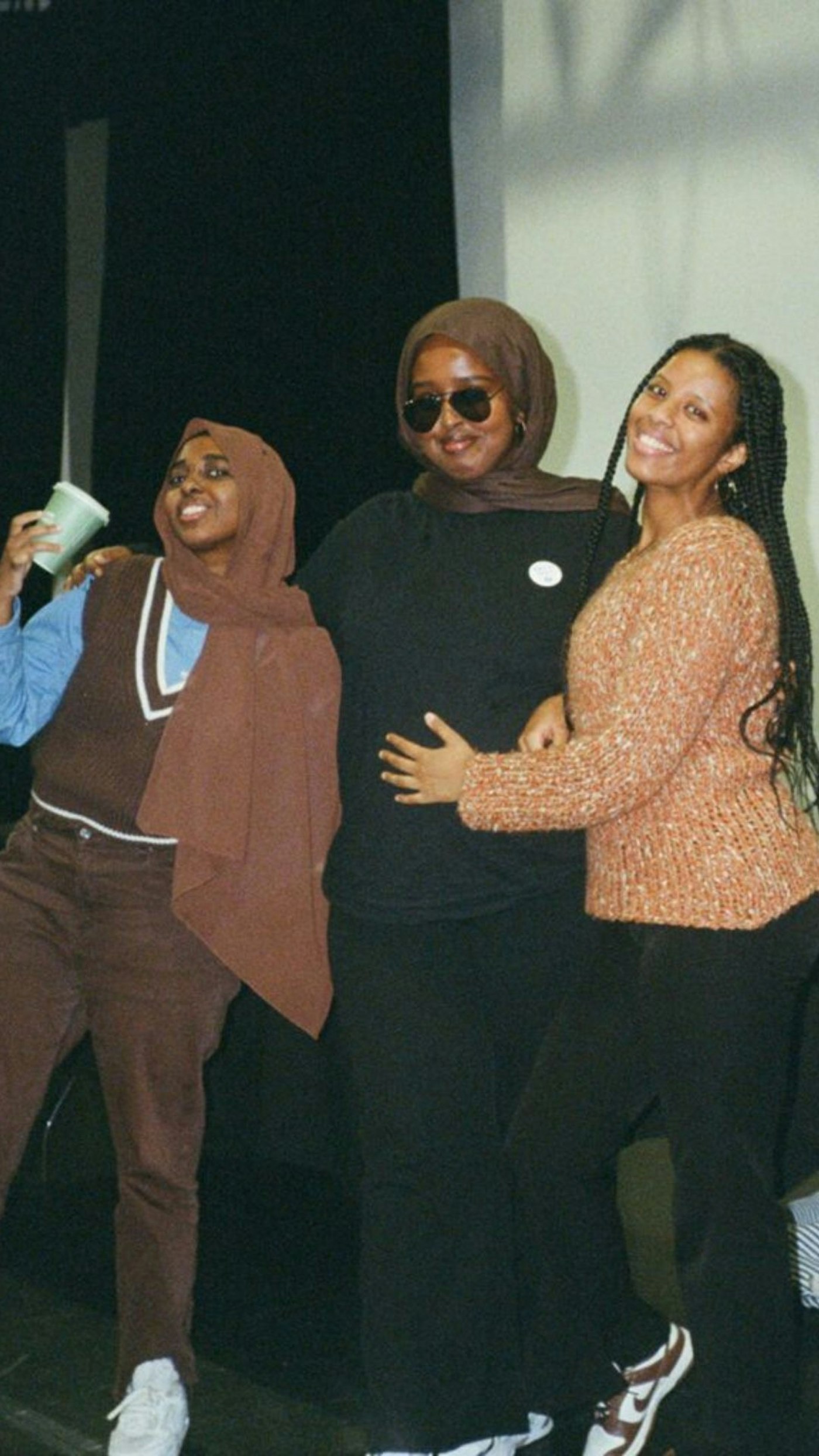Desperate Times: Somali Storytelling Meets Laughter and Chaos
by Furvah Shah in Culture & Lifestyle on 22nd April, 2025

A petty thief and compulsive liar who lives for the drama, but soon tells a fib that snowballs and overtakes her entire life. How long can she keep up the act? This is the premise of the sell-out play Desperate Times, which returns for a final run at London’s Pleasance Theatre this April.
Written by first-time playwright Amal Abdi, the production will leave you in fits of laughter with a hilarious, witty one-woman performance from Nadjma Abshir, who leads as supply teacher and elaborate storyteller, Lucky. From jokes about NPCs and BBL Drizzy to exploring themes of loneliness and desperation, the play is a must-watch for those wanting to learn and laugh until they cry.
Since its first sell-out run at Rich Mix Theatre, the play by Side eYe productions (the team behind Dugsi Dayz and Muna Knows It All) has had audiences immersed across the country during its tour. Plus, its all-Somali cast and crew bring a breath of fresh air to the often exclusive theatre space.
Ahead of its run at the Pleasance Theatre, Amaliah sat down with the Amal, Nadjma and directors Fatima Ali Omar and Adna Ahmed. We met at Culture House, a newly-opened Somali community centre in West London, to chat about the creation of the production, inclusivity beyond the stage and their hopes for the future of Desperate Times.

Tell us about writing Desperate Times. Where did the idea first begin?
Amal: The idea first began when I was feeling really hot on the Central Line and I just wanted to fake a pregnancy so I could sit down on the tube. Then, I just came up with the character of Lucky, and I’d write notes about her once in a while. It was giving Wattpad fan fiction.
Eventually, I had this character built out and then by complete chance, I saw a call out by Side eYe [Productions] who asked for five pages of a script. I submitted, had an interview, it went well, and then I ended up winning this competition [to create a play] for Somali Week Festival for three nights, which has since spiralled and we’ve now done 13 performances on tour around the UK. This is our last theatrical run, but not the end of Desperate Times.
How did you go about writing Lucky’s character? Where did you find inspiration for her from, and how has she developed over time?

Amal: At the beginning, she was more based on me, and as I carried on writing, I built out the character to make her more outlandish and wacky. Nadjma added a lot to it, as Lucky is a collaboration of all of us as a crew. It feels strange talking about a character as a real person, but she does feel like a person that I’ve birthed and is now a teenager.
Nadjma: Amal is a very generous writer who has allowed me to improvise, as a lot of the jokes have developed over time, and Lucky has become a lot wackier. Am I Lucky? No. I’ve never robbed in my life. Never could, I’d be in prison.
Fatima: I will add that Nadjma is being very humble and that she’s very naturally charismatic and funny. Every time she performs, she gets better and better with each laugh. It’s such a treat to watch her because the Lucky that we started with and what Nadjma has brought to the table has made it an absolute ruckus show from beginning to end.
Nadjma: It’s definitely a collaboration, though, because there were moments where I was a bit stuck, as this is the first time acting and going into this, I was very scared. I nearly quit! But, I got a lot of support from the team, and with that, I built a lot of confidence and was able to create the Lucky that we have today.
Nadjma, as a first-time actor, how did you become involved in playing the character of Lucky, and what do you do when you’re not on stage?

Nadjma: Funnily enough, I never saw the original ad, but a friend sent it to me and said, “I really think you should do it.” Then, I was sitting one day drinking green tea, and I was like, “I’m nearly 30, why not?”
I applied, had no expectations and then I got the call back, and I was like, “Oh, well, this is real”. Then, I sent a self-tape late with an apology email. Then, they told me I got the role, and I was totally shocked. I’m a marketing babe full-time, and I do this on the side, but I was always interested in acting. When I was younger, there were only a couple of roles available if you weren’t playing a refugee or something quite dangerous. Plus, we come from backgrounds where our parents want the best jobs, like a teacher or a lawyer.
Why is working with the predominantly Somali team at Side eYe Productions important to you all?

Amal, Nadjma, Adna
Fatima: I feel what really helped was that we all had a base understanding of each other, and I think that familiarity gave us chemistry. It’s mine and Adna’s first time directing a play, Amal’s first time writing and Nadjma’s first time acting, so it really felt like everybody was starting from the same place. It was so nice to look around and see Somali girls with jobs to pay the bills, but pursuing something we loved when we were younger.
Adna: Being similar ages and coming from similar backgrounds, we understood the pop culture references and could add more to the script. We all understand each other, can relate to the story and the writing. We’re all so passionate about pursuing this too, as it’s such a difficult career to get into, especially being working class. But the economy is so bad there, you may as well pursue your dreams.
Amal: There’s a line in the play that references how Somalia is a nation of storytellers. Even though the first draft was for the Somali Week Festival, I just wanted to write a character who happens to be Somali, but is also a thief. Her faith and her background are almost incidental to the character, who is so wacky and ridiculous. I want people to come to the theatre, forget their problems for an hour and watch someone else make stupid decisions.
Desperate Times has been on tour up and down the country. What has the reception been like, and how does it feel to see the production go so far?
Amal: It was crazy. I thought we were having three performances, and I was like, “Oh, time to go back to my job.” Going on tour was so fun, and the best one was at the Birmingham Hippodrome, as we had a workshop with 15 to 20 young Somali girls who were experiencing theatre for the first time. They thought Nadjma was a celebrity and were taking selfies with her!
Nadjma: I’m just a marketing babe, I want to go home and do my Sainsbury’s order!
Amal: It’s so cool for them that they now see theatre as something expansive, in a way that we didn’t back then. The way the industry is moving is very encouraging. We were scared of going outside London because we thought it might be a bit London-centric, or people outside might not like it as much. But the Somali and Muslim audiences really came through.
Fatima: The feeling in the room when the performance is ready is indescribable. Seeing all of these, young Somali and Muslim girls stream in so joyously, and every venue we’ve visited has told us, “We’ve never had an audience like this before, we’ve never had that many smiles after a show.” It’s just a nice feeling.
Nadjma: I think we all have a bit of Lucky in us. The idea of masquerading to be something you’re not, loneliness, having a façade, is why she is so relatable and why we were able to take her to different cities and still have a good reaction.
Amal: I just want to big up Nadjma’s improv skills because every single show that we’ve done, there’s an ad-lib that she’ll pull out that we’ve never seen before in rehearsals, and she’ll always get the biggest laugh possible. I don’t know where it comes from, but she’s always smashing it at every single show.
Nadjma: I told you, I’m a clown! When I get a laugh, something happens to me.
Amal: She’s like Taylor Swift. Like every Eras Tour is different, every performance of Desperate Times is different.

What does representation mean to you, and do you think theatre is becoming more inclusive?
Amal: I think there’s a change in programming. There are more diverse shows that weren’t there five or ten years ago, when shows were just about white people and their divorces. It feels like bigger and broader stories can be told, but it doesn’t feel that diverse in terms of people working behind the scenes, as a lot of artistic directors, programmers, and that sort of thing still feel white. Also, money is an issue as it’s just catered for middle-class rich people. So that’s really difficult, but there’s not a lot we can do about that.
Fatima: On the surface, it looks like there’s more inclusion and diversity. Any programme you look at right now, there’s definitely your pick and places like Bush Theatre and Brixton Theatre are really putting on great work and championing young, diverse voices. I think the kind of person who can do well is like a self-starter who has a story to share and ends up being given a platform, but it definitely could be easier because sometimes it feels like we’re all fighting to enter the same competition. You shouldn’t have to be fighting for scraps with your peers in order to get your show made. It should be something that’s available to us all. So I think we still have a long way to go, but it is heartening to see the programming that we’ve seen in the last few years.
Where do you want Desperate Times to go next?
Amal: l have unlimited dreams for it. I’m not bored yet, so I’d love to see it adapted to a bigger stage, possibly a screen. We’re trying to move it along, but we’ll see what happens as it’s not in our hands, but we will try.
Fatima: It ain’t over until it’s over!
Adna: We want a BAFTA!
Desperate Times returns to Pleasance Theatre from 23rd to 25th April. Tickets are available here.
Written by Amal Abdi
Performed by Nadjma Abshir
Directed by Fatima Ali Omar & Adna Ahmed
Sound Design by Calum Perrin
Lighting Design by Matthew Hockley
Associate Lighting Design by Jonathan Chen
Stage Managed by Atlanta Sonson-Chapman
A side eYe Production
Furvah Shah
Furvah Shah, 23, is a culture and lifestyle journalist currently working at Cosmopolitan Magazine. Being from a Pakistani, Muslim background, Furvah is passionate about diversifying representations of women, Muslims and ethnic minorities within the media and passing the microphone to underrepresented communities.